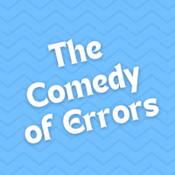
Overview
Synopsis
In The Comedy of Errors, Shakespeare’s shortest play and one of his most farcical comedies, we see the problem that arises when one loses their identity. The story follows two sets of twins, separated at birth: The Antipholuses (of Syracuse and Ephesus) and their servants the Dromios (also of Syracuse and Ephesus). Antipholus of Syracuse and Dromio of Syracuse are on a journey to find their long lost brother and mother who were lost in a shipwreck that separated their family. On this particular day, they have ended up in the town of Ephesus where, unbeknownst to them, their twin brothers reside. Chaos ensues when the people of the town continue to confuse the brothers for one another, including (but not limited to) Adriana, the wife of Antipholus of Ephesus, thinking her husband must be mad when he claims to not know who she is; Angelo, a shifty goldsmith, getting an officer to arrest Antipholus of Ephesus when he refuses to pay him for a chain he’s already received; or Luciana, Adriana’s sister, claiming that her sister’s husband confessed his love for her. We see the twins try to navigate through a world that seems to have lost all its wits.
Show Information
Context
It is thought that William Shakespeare wrote The Comedy of Errors between 1589-1584. It is based on a play called Menaechmi by Plautus, which would have been a well-known story in Shakespeare’s day. The Comedy of Errors and The Tempest are the only two Shakespeare plays that observe unity of time--the entire plays occurs over 24 hours, and it is definitely Shakespeare’s most slapstick type of comedy. Although most scholars find little depth in The Comedy of Errors, many consider it to
to read the context for The Comedy of Errors and to unlock other amazing theatre resources!Plot
Act 1, Scene 1
Egeon, a merchant of Syracuse, has been apprehended in Ephesus. The lands of Syracuse and Ephesus has been at war and it is now law in Ephesus that if a Syracusan comes to their land, they must either pay a thousand marks or be put to death. Egeon doesn’t have thousand marks and so is sentenced to die, however, he tells the Duke of Ephesus that he is ready to die because it would end his woes. The Duke, curious about Egeon’s comment, asks him why he is so sad. Egeon tells
to read the plot for The Comedy of Errors and to unlock other amazing theatre resources!Characters
| Name | Part Size | Gender | Vocal Part |
|---|---|---|---|
|
Lead |
Male |
Spoken |
|
|
Lead |
Male |
Spoken |
|
|
Lead |
Male |
Spoken |
|
|
Lead |
Male |
Spoken |
|
|
Lead |
Female |
Spoken |
|
|
Lead |
Female |
Spoken |
|
|
Lead |
Male |
Spoken |
|
|
Supporting |
Male |
Spoken |
|
|
Supporting |
Male |
Spoken |
|
|
Supporting |
Female |
Spoken |
|
|
Supporting |
Male |
Spoken |
|
|
Supporting |
Female |
|
|
|
Featured |
Male |
|
|
|
Featured |
Male |
Spoken |
|
|
Ensemble |
Male |
Spoken |
|
|
Ensemble |
Male |
Spoken |
|
|
Ensemble |
Male |
Spoken |
|
|
Ensemble |
Male |
Spoken |
Songs
A song with an asterisk (*) before the title indicates a dance number; a character listed in a song with an asterisk (*) by the character's name indicates that the character exclusively serves as a dancer in this song, which is sung by other characters.
Monologues
Scenes
Key Terms
A term used in classical theatre to refer to a woman who runs a brothel; often used in comedic or bawdy contexts.
To conceal one's true motives or feelings, a frequent tactic in English Renaissance drama.
An archaic form of 'do,' used in English Renaissance plays.
A dull or faded costume color used to reflect low status or mood.
Relating to the reign of Queen Elizabeth I, marked by flourishing English drama and playwrights like Shakespeare and Marlowe.
An exclamation of disapproval or disgust found in English Renaissance and Shakespearean plays.
An archaic or poetic word meaning 'from here' or 'as a result'; common in English Renaissance texts. This term plays a vital role in understanding theatrical structure and is commonly encountered in stagecraft or performance settings.
An archaic term meaning 'hurry,' often used in Shakespearean and Renaissance drama. This term plays a vital role in understanding theatrical structure and is commonly encountered in stagecraft or performance settings.
An old-fashioned term meaning the top of the head, used humorously in Shakespearean and other classical texts.
An Italian term meaning 'Mister,' often used in opera or classical drama to denote respect or character hierarchy.
A speech delivered by a character alone on stage, revealing inner thoughts or emotions to the audience. Common in Shakespearean plays.
An archaic second-person singular pronoun meaning 'you,' used in English Renaissance drama to indicate intimacy or formality.
An informal second-person pronoun used in Shakespearean and early English theatre, equivalent to modern 'you.'
Videos
Quizzes
Themes, Symbols & Motifs
Sorry! We do not currently have learning modules for this guide.
Quote Analysis
Sorry! We do not currently have learning modules for this guide.
